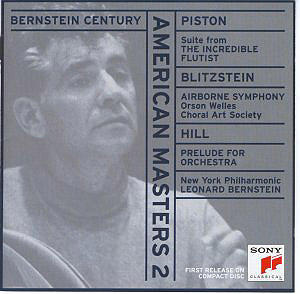The Piston suite is his most famous work though
its fame is largely unmerited. It is nowhere near as fine a work as
any of the first six Piston symphonies. The Second, Third and Sixth
stand out in this company. The Flutist ballet music has glitz
and glare in spades and, to be fair, Bernstein probably gives it more
pizzazz than any other version. If the work appeals then go for it.
If you do not know it then think in terms of a confection of Satie (Relache
and Parade), Stravinsky (Pulcinella and Dumbarton
Oaks) and Berners (Triumphs of Neptune) with a dose of the
more glittering and obvious moments from Schuman's New England Pictures.
I must thank Tim Page who can always be relied on for
economical, lucid notes. He points out that Blitzstein was a
sort of mentor to Bernstein and his debt (largely unrecognised) is said
to be great. It seems fitting that the Symphony should be recorded by
Bernstein 20 years after it was written. It is a symphony only in a
similar sense to the Morning Heroes symphony of Arthur Bliss.
It is scored for narrator, tenor, baritone, chorus and orchestra (with
wind-machine). There are twelve sections, each separately banded on
this disc. The titles give some flavour of the wartime fervour of the
piece: Theory of Flight, Ballad of History and Mythology, Kittyhawk,
The Airborne, The Enemy, Threat and Approach, Ballad of the Cities,
Morning Poem, Air Force: Ballad of Hurry-Up, Night Music: Ballad of
the Bombardier, Recitative: Chorus of the Rendezvous, The Open Sky.
Welles is in young and smooth voice. He does not scorch the sky with
the hoarse volume of an Olivier. The CD booklet does not give the words
but Welles is all clarity without the lofty affectation that can settle
on the shoulders of English orators in RVW's Oxford Elegy or
the Bliss work. However texts would have been useful for the choral
and solo singer interjections. I mentioned Bliss. The history of flight
was also charted in Bliss's music for the film The Age of Flight.
I detect in Blitzstein's music the knowledge of Copland's Lincoln
Portrait also for orchestra with narrator. The Blitzstein is of
calculatedly ambitious grandeur - designed to make an occasion. It takes
something from the USA's patriotic wartime grit exemplified by Roy Harris's
Fifth Symphony. The references to the bombing of Guernica, Warsaw, Manila
and London still carry a potent charge. The choral singing recalls Vaughan
Williams' Dona Nobis Pacem and Whitman's 'immense and silent
moon'. The tableaux bind the allies together although the effect at
the first performance might well have been politically strained in a
way that would not have happened if the work had been premiered during
1945 rather than 1947. The spirit and universal bond reaches back (e.g.
in Open up that second front - track 23) to the words of John
Addington Symonds in John Ireland's These Things Shall Be and
to Randall Swingler for Britten's Ballad of Heroes and of Alan
Bush's Piano Concerto. By 1947 the US was already well down the turnpike
to realigning against such threatening universalism.
Hill, from the generation or two before Bernstein's,
represented the 'Gallic' tradition in US music. Along with Loeffler,
Farwell and Coerne, Hill tramped a quite different path from the more
Germanic Paine and Chadwick. This group was much more inclined to impressionism
and pantheistic delights. The classic late nineteenth century watercolours
of the North American wilds also played a role. Man's loneliness or
insignificance in the face of nature's vastness were wrapped into the
quite unGermanic and Delian approach. I knew the Hill Prelude from a
tape sent to me by Mark Lehman back in the 1980s. It must have been
taken from a very scrawny and distressed LP. Through all the brawling
and scratching I, even then, picked out that this was an atmospheric
companion work to Delius's In a Summer Garden, Roussel's First
Symphony and Bax's Summer Music and Enchanted Forest.
Not to be missed but very different from the other two works here. Surprising
too that this jewelled insubstantial piece dates from 1953 the very
year in which it was recorded. On this showing I would be pretty confident
that Hill's Violin Concerto and Symphonies would be worth hearing even
if his Stevensoniana suites (once available on 1960s SPAMH LPs
under Karl Krueger's direction) are unpromising. Fingers crossed that
Naxos do not run out of steam before they get to Hill in their American
Classics series. This is just the sort of piece I would have expected
Bernard Herrmann to champion and with his links as a CBS 'staffer' I
would not be surprised to see him directing performances.
A varied collection but extremely attractive and not
lacking in personality.
Rob Barnett

![]() cond. Leonard Bernstein
cond. Leonard Bernstein
![]() SONY CLASSICAL Bernstein
Century series SMK 61849 [78.09]
SONY CLASSICAL Bernstein
Century series SMK 61849 [78.09]